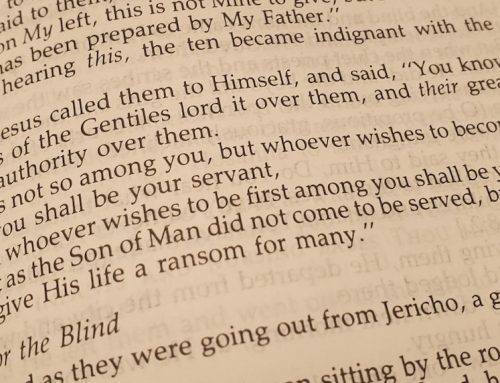We often call the Christian assembly “worship” or “worship service.” But if we’re going to use “Bible terms for Bible things,” should we? Maybe, maybe not. Let’s think this through.
Is the congregation primarily a format designed to follow a specific pattern of prescribed worship and service to God? Or is its purpose to strengthen and build up believers to steel them against the persecutions they might face? In short, is it for Him or for us?
These are two very different philosophies that lead to two very different conclusions about what happens “in church.” I really don’t like saying that phrase anymore, since we are “in” the church (the called out of Christ) no matter where we are. But I used to be in the former camp, looking to decipher the New Testament pattern of the assembly with a microscope for fear of offering “strange fire” as Nadab and Abihu did. I once argued that the “service” was not for us, but for Him. That’s nonsense.
Have you noticed there is not one reference in the Bible to our corporate gathering as a “worship service?” We can, of course, deduce that worship can take place within the assembly:
Hebrews 13:15 – Through Jesus, therefore, let us continually offer to God a sacrifice of praise–the fruit of lips that confess his name. (NKJV)
We can reasonably infer that a sacrifice constitutes what we might call “worship” in a traditional sense, so when we praise God in the assembly, we are indeed worshiping Him. Fair enough. But the writer of Hebrews goes on:
Hebrews 13:16 – And do not forget to do good and to share with others, for with such sacrifices God is pleased. (NKJV)
So doing good in all forms and sharing with others also constitute acceptable sacrifices, or worship toward God. This does not have to be done in a group setting or by the group corporately. It can be. But it doesn’t have to be. It’s worship no matter how or when it’s done.
Is teaching one another in psalms, hymns, and spiritual songs an act of worship? I think it can be in an individual sense, since Paul wrote to the Christians at Ephesus to sing and make melody “to the Lord:”
Ephesians 5:18-21 – And do not be drunk with wine, in which is dissipation; but be filled with the Spirit, 19 speaking to one another in psalms and hymns and spiritual songs, singing and making melody in your heart to the Lord, 20 giving thanks always for all things to God the Father in the name of our Lord Jesus Christ, 21 submitting to one another in the fear of God.(NKJV)
But the worshipful singing and making melody to the Lord could also take place absent from the assembly (like in the car listening to Christian music, for instance), whereas the instruction to speak to each other with psalms, hymns, and spiritual songs could not. That requires “each other.”
So if our gathering fails to edify those participating in it, I would conclude that it was not effective at meeting the spirit of these verses. Acceptable worship may have been offered in the heart of the individual who participated worshipfully, but if the brethren weren’t edified, it could just as easily have been done at home in one’s personal devotion. Paul implies as much when he gets after the Corinthian church for using the gift of tongues for one’s own benefit.
1 Corinthians 14:26 – How is it then, brethren? Whenever you come together, each of you has a psalm, has a teaching, has a tongue, has a revelation, has an interpretation. Let all things be done for edification. (NKJV)
The only conclusion we can draw from this is that there is no purpose in doing anything as an assembly unless it edifies. This is why Paul told Corinth:
1 Corinthians 14:28 – But if there is no interpreter, let him keep silent in church, and let him speak to himself and to God.
This brings us to the Lord’s supper. Surely this is a pure act of worship–a “sacrament” as some might call it. Surely the Lord’s supper must be administered according to some fixed pattern as an act of worship, right? Some might return to Paul’s Corinthian letter to support this idea:
1 Corinthians 11:16 – The cup of blessing which we bless, is it not the communion of the blood of Christ? The bread which we break, is it not the communion of the body of Christ? 17 For we, though many, are one bread and one body; for we all partake of that one bread. (NKJV)
But I think we misunderstand communion as a noun, rather than as the verb “to commune” or “to fellowship.” If the cup is the fellowship of his blood, and the bread is the fellowship of his body, we might conclude that to partake of them is an act of worship toward Him. I would agree. But note that our participation together as a congregation is what makes a congregation “one bread” and “one body.” We are one body because we partake of that one bread.
Communion (fellowship) with Jesus’ body and blood is for the purpose of solidifying our communion (fellowship) with each other. To fail to commune (fellowship) with our Lord in this activity is to fail to commune (fellowship) with our fellow brothers and sisters. It is evident that the Lord’s supper is as relevant to our own strengthening as it is to our worship toward God. Other scriptures add another us-directed facet to the picture:
Luke 22:19 And He took bread, gave thanks and broke it, and gave it to them, saying, “This is My body which is given for you; do this in remembrance of Me.” (NKJV)
It is true that anytime we follow Jesus’ instructions with a heart of humble obedience, it is worship. But note that Jesus tells the disciples the reason for the Lord’s supper: “Do this in remembrance of me.” The Lord’s supper is an activity designed for us to remember the Lord’s sacrifice, and by that remembrance, it should invigorate us anew to serve Him. It is not a rote “sacrament” to simply check off of our to-do list. We love him because he first loved us, and it is a memorial of that love, intended to spur us to respond in kind. This is further borne out by Paul:
1 Corinthians 11:23-25- For I received from the Lord that which I also delivered to you: that the Lord Jesus on the same night in which He was betrayed took bread; 24 and when He had given thanks, He broke it and said, “Take, eat; this is My body which is broken for you; do this in remembrance of Me.” 25 In the same manner He also took the cup after supper, saying, “This cup is the new covenant in My blood. This do, as often as you drink it, in remembrance of Me.” (NKJV)
But check out the additional purpose to the Lord’s supper Paul mentions in the next verse:
1 Corinthians 11:26 – For as often as you eat this bread and drink this cup, you proclaim the Lord’s death till He comes. (NKJV)
Each time we commune with our Lord and with each other in this manner, we are proclaiming, or preaching, His death. To whom are we preaching, to God or men?
The conclusion of all of this is that no part of our assembly is to be done with the exclusive goal of worshipping our Creator. This may sound sacrilegious and postmodern at first. It is not. No doubt, we ought to assemble to worship our God and remember what Jesus did for us, but we should never let the goal of edifying (building up) the brethren escape our highest aspirations. It is possible for individuals to come together to worship the Lord without edifying the brethren, but I think that’s a waste of a Sunday. We could have done that at home or in the car. In the assembly, our primary purpose should be to edify each other, while at the same time sharing in our mutual worship of God.
If worship is our only purpose in meeting together, we are constrained by the lessons of Nadab and Abihu, and Cain and Abel to offer to our Lord an assembly, appropriately patterned in every last detail according to His blueprint. But when we do that, we’ve mistaken the tool for the thing that the tool is intended to accomplish. The point of the assembly is not the assembly itself, but the edification of the saints, just as the point of the Lord’s supper is not the pattern for doing it, but the doing of it.
It is impossible to pattern the assembly after an exact blueprint, because we don’t have an exact blueprint without resorting to doubtful deductions and opinions. Should the Lord’s supper be practiced in an upper room? That is the only discernable pattern in the scriptures. Should it be done in the evening? That was most certainly the pattern of the New Testament church. Should we stop meeting in church owned property? The New Testament church met in homes, not church buildings.
But fortunately, we are not under a law of patterns and blueprints, but a law of liberty. The patterns we see for the assembly have not been handed down as “the pattern in the Mount,” but as loving examples intended to edify and build us up in our common faith. We are to use what practices we do have exemplified in various scriptures as tools to accomplish our primary task as a body–to edify each other, and in so doing, glorify our God. So is our assembly a “worship service?” I suppose it can be, but perhaps a better term is “edification service.” How about next time we go to edification service, let’s worship God in spirit and in truth while we’re there.







Kevin, thank you for taking the time to post this. You’ve given lots of food for thought.
Largely subjective post. Whether someone is ‘edified’ or not, is a matter of individual preference. Kevin, you are becoming a Christian Sophist. In that, I mean that you take the absolute truths, and you approach it as the ancient Sophists of Athens did. “Man is the measure of all things’ said Protagoras, one of the leading sophists, and this is the approach you take towards Christianity. There are no absolutes. I’m not even certain if you believe all sex outside of marriage is a sin. I’d like for you to confirm that, because if that elemental basic of the Christian… Read more »
Monte, I am a little confused-so please do not take offense at my question! When you asked Kevin”how would that work at your job, Kevin”, are you saying that a bible class is a part of our “job” as Christians?
Again, just trying to clarify for better understanding of where you are going with your analogy!
thank you! 🙂
A job is what one does to earn money. Duty is the debt we owe for salvation, which we never can pay.
Romans 6 says that we are either slaves to evil or to righteousness. Being a slave has duties.
The only place where success comes before work is in the dictionary.
The only reward for doing what is easy is it is easy.
A smooth sea never made a skilled sailor.
Per ardua, ad astra, through difficulties to the stars.
Sorry to such a dunce, Monte! But I am still not clear as to what your analogy was for Kevin. You used work as the analogy, his job. I was hoping you would elaborate on that analogy, by explaining how Christianity is similar to our jobs. Again, not trying to offend, just trying to understand! Thank you!
Yes, Debby, Work was used as an analogy. Luke 17: And the Lord said, If ye had faith as a grain of mustard seed, ye might say unto this sycamine tree, Be thou plucked up by the root, and be thou planted in the sea; and it should obey you. 7 But which of you, having a servant plowing or feeding cattle, will say unto him by and by, when he is come from the field, Go and sit down to meat? 8 And will not rather say unto him, Make ready wherewith I may sup, and gird thyself, and… Read more »
Thank you Monte. Still doesn’t explain what you meant to Kevin, but that’s ok. I’ll think on it for a bit! 🙂
A job is work performed for agreed upon wages. To even bring this analogy into this discussion means you haven’t grasped the difference between law-keeping and grace. Even well-known Jewish radio personality Dennis Prager has acknowledged that he struggles with the difference between Jewish law vs. Christian grace. He admits that the Torah calls for actions, and the heart doesn’t really matter too much, and that this philosophy has caused Jews to not be nearly as evangelistic as Christians. He also acknowledges the vast amount of good works that have come from Christians flipping the order of these events around:… Read more »
Kevin, I was anxiously waiting for your take on what Monte said about our ‘duty, job’ etc. It’s such a slow process but I think I’m understanding the essence of grace & law more and more. Years of indoctrination is tough to get over. Cancerous thinking is a good description of what I’m trying to overcome.
I, too, was waiting for your thoughts on this! I agree, Striped Fish, that it takes a very loooooong time to get past the needing to earn our salvation. Which also means that I still struggle with the fact-yes, I know it is a fact-that I am forgiven and will continually be forgiven. But Merie’s group had successfully drilled into me that my soul was in constant peril. For about 5 minutes after taking the Lord’s supper I might have felt as though I was on my way to heaven-and then would come the sermon- which reminded me, again, that… Read more »
Ikr? This is why I pulled this quote into the bottom of the site: “Fix a doctrine, you’ve got hundreds more to fix. Fix love, and virtually everything else falls into line. Love changes motives, behaviors, relationships, exegesis, everything. There is nothing in life and faith that are left untouched by the subject of love.” Wives, do you want to be treated special by your husbands because he is expressing the love that is in his heart, or because it’s his duty? Sometimes parenting may feel more like an act of duty than an act of love. But kids are… Read more »
Kevin, another topic relating to “worship” ….. The communion, or the breaking of bread. I know the history of Stanton running this into the ground, and i also know they often miss the main points in these areas and nit-pick them to death. Many mainstream churches serve premade squares or wafers of unleavened bread for communion. Some say ” They are not BREAKING the bread. Is not the “breaking of bread” the partaking of the bread as a body in common union that is the whole point? NOT whether the bread is broken ,literally, before it is served?? Matthew 26;26… Read more »
Yes, “breaking bread” is simply an expression for having a meal. What we call the “Lord’s supper” seems originally to have been what they called a “love feast” back in the early part of the first century. I would equate it to what Stanton might call a “fellowship” and other churches call a “pot luck.” However, I personally think 1 Cor. 11 marks a turning point in Paul’s teaching. I think the “love feast” was often combined with the Lord’s supper that Jesus instituted (because it’s a logical time to do it, since you’re already eating together). But Corinth was… Read more »
I have seen over the decades the softening of what Christianity is supposed to be. I have seen from the early 1900’s to the 1960’s where people deemed it important to attend worship on Sunday’s and the gradual tapering of that necessity as we approached today. Even a lot of the religious world believes that you really don’t have to attend. I have seen where they believe that, “For where two or three are gathered together in my name, there am I in the midst of them.” relieves them from attending the worship. We have, now, gotten to the point… Read more »
I totally agree that coming together as a body of believers is extremely important, and if anyone read my article thought I was suggesting otherwise, I apologize. But I am committed to understanding and speaking truth no matter what that means for beliefs we (or I) dearly hold. Truth has to win, at the end of the day, regardless of whether the truth moves me to the ideological or cultural right or left of my brothers and sisters in Christ. It is not where we stand in relation to our brothers and sisters that matters—it is where we stand in… Read more »